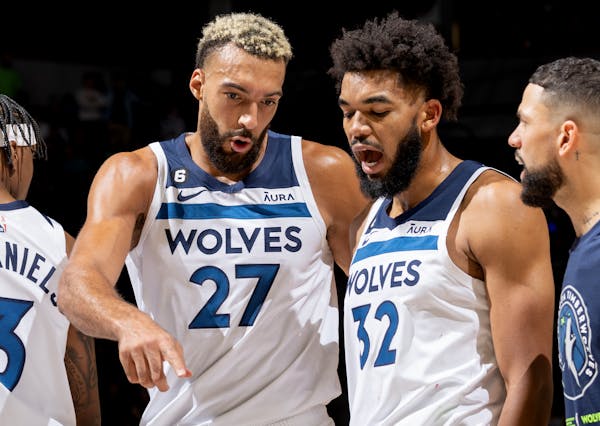Karl-Anthony Towns was able to do some "live-action" basketball activities last week as he tries to ramp up to play again this season. The Timberwolves have only 14 games left this season, and with Towns still at least some time away from playing again, it's natural to wonder just what version of Towns the Wolves will be getting when and if he should come back, and how will the team integrate him into what it has been doing without him this season.
1. How much will Towns play and how good will he be?
It's a safe bet to think Towns will be under a minutes restriction, at least for the first few games, when he returns. Coach Chris Finch suggested that could happen, when discussing Towns' status. He also said one way to manage those minutes might be to have Towns come off the bench. This is similar to what the Wolves did two seasons ago when D'Angelo Russell was coming back from a knee injury.
Towns coming off the bench, at least initially, might also be a way for the Wolves to limit any potential awkwardness he might have playing alongside Rudy Gobert. Towns could end up taking the minutes that typically go to Naz Reid, and the Wolves could play Towns sparingly, at least at the start of his comeback.
When Towns does return, it's hard to say just how effective he will be. The Wolves don't have to look farther than their own bench to see what a recovery from a calf injury might look like. Point guard Jordan McLaughlin missed a total of 35 games dealing with his own calf injury, and McLaughlin said recently he didn't feel like himself at least for the first eight games he was back.
When Towns returns, the Wolves likely won't be getting the version who has made two All-NBA teams right away.
2. How will this affect how the Wolves play?
This can depend whether Towns comes off the bench or if the Wolves play him a lot of minutes with Gobert right away. When Towns was healthy, he played 401 of his 709 minutes with Gobert, and the Wolves need to know what they have in the Gobert-Towns partnership. Finch said that's a must for the organization moving forward.
"Regardless of what happens between here and the rest of the season, getting KAT with this group is such a priority just to see what we have," Finch said. "... We need to discover for offseason evaluation, tweaking, strategy, game plan, whatever it might be, we got to see what this thing looks like.
The Wolves were 9-10 in those games and had a clunky start to the season on both ends of the floor. The Wolves were 15th in offensive efficiency and 17th in defensive efficiency in the 21 games Towns played.
After he went down, those numbers separated, and the Wolves have formed more of a defensive identity since he went out. They are 22nd in offensive efficiency and 10th in defense in the games Towns has missed. In particular, the Wolves had trouble in transition defense when both Gobert and Towns were on the floor. Teams took advantage of the lack of speed.
The Wolves also tended to switch defensive coverages whether Gobert is on the floor or not. When he plays, the Wolves are typically in a form of drop coverage. When he doesn't, the Wolves tend to play more of a high-wall flying-around style they executed with Towns last season. This is how the Wolves tend to play when Reid is on the floor for Gobert. Bringing Towns off the bench and not playing him with Gobert could keep that balance in play and give Towns a familiar runway to play defense as he comes back. Forward Jaden McDaniels suggested this might be what the Wolves do.
"I think he will fit in just fine," McDaniels said. "I mean, it just depends what defense we are in. I feel like they're probably gonna put him in high wall. He's good at it, he did a good job all last year doing it. Just coming in as the missing piece, really."
But again, the Wolves want to see how Towns and Gobert pair together on both ends of the floor.
3. Why come back at all?
If the season goes on long enough, why shouldn't the Wolves just shut Towns down for the remainder of the season, especially if his return might complicate what the Wolves are doing now? For one, the Wolves were just below .500 when Towns got hurt, and they are still at .500 entering Monday's game against Atlanta. Second, the optics would look bad for all involved and especially Towns, who might get the unfair label that he didn't want to come back.
Third, if the Wolves do get him back for the end of the regular season and playoffs, maybe they can discover some of what the ceiling of this team can be – or see how low the floor can go. Either way, that provides information for the offseason, so long as Towns plays in enough games to make the data worthwhile. But with each game that goes by, that sample size for evaluation gets smaller, as does the ramp-up period for Towns to get back fully to 100%.



![Naz Reid (11) of the Minnesota Timberwolves Wednesday, March 27, 2024, at Target Center in Minneapolis, Minn. ] CARLOS GONZALEZ • carlos.gonzalez@](https://arc.stimg.co/startribunemedia/TGYNEKQCYNH5VEPCXSJODRMDDM.jpg?w=75&h=75&fit=crop&crop=faces)



